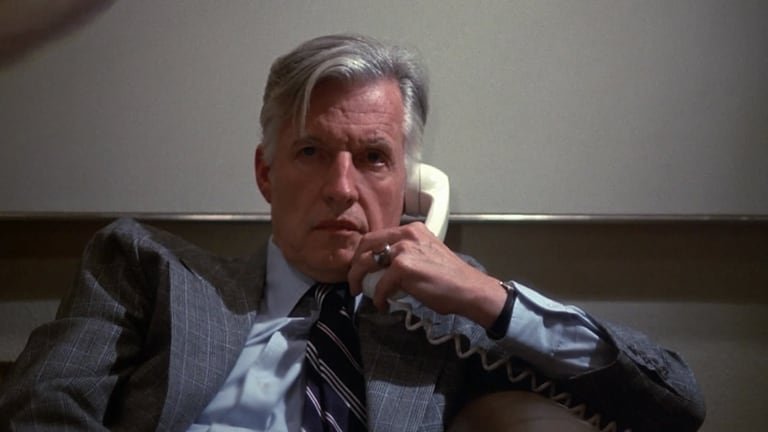Wesley Addy, Supporting Actor by Matt Olsen
His name most likely won’t ring a bell and even seeing his face in the accompanying photograph here might not help, either. Wesley Addy never played the lead in any of the twenty feature films in which he appeared between 1955 and 1996, including some well-known titles such as Kiss Me Deadly, Whatever Happened to Baby Jane, and The Verdict. His career, which also encompasses decades on the stage and dozens of television roles, has him frequently lodged at a third or fourth billing tier.
His name isn’t typically included on any list of great supporting actors and I suspect that’s due to his acting style rather than the quality of performance. He doesn’t set the screen on fire like Timothy Carey or Madeline Kahn, for example, and as is the way with most character actors, Addy’s career doesn’t present a wide range of personalities. He generally plays his roles with a similarly distanced calm and world-weariness. His long, lined face, tired eyes, and silver hair also suggest the kind of wisdom earned from, if not experience, at least observation. It’s these particular traits that make him the perfect foil to play opposite much more emotionally active characters and scenery chewers. (Intended in only the most loving manner.)
This is especially pronounced in his scenes with Jack Palance in 1955’s The Big Knife, directed by Robert Aldrich – who cast Wesley Addy in eight films. Palance plays a successful Hollywood star looking to extricate himself from the studio system and make “meaningful” movies. As the system closes in around him, refusing to let him go, he bares his agony and torment on the surface. He’s in raw agony for most of the film. In contrast, Wesley Addy’s character, a screenwriter friend, stands slightly removed watching with a sense of pity as Palance’s life inexorably explodes from forces self-inflicted and otherwise. But because the motives of Addy’s character aren’t absolutely pure – he’s in a relationship with Palance’s estranged wife – he remains grounded. There’s no “what fools these mortals be” in his performance. Humanity is always present in the character’s reaction to the frailties of fortune and fate.
In John Frankenheimer’s 1966 psychological science fiction film, Seconds, Addy plays another version of the detached advisor. After undergoing a highly secretive surgery to restore his youth, Rock Hudson’s lead finds himself moved into a Malibu beach house with a brand-new life absent of any connection to his past, including his wife and family. Addy plays a sort of personal valet tasked to smoothly settle Hudson into his new existence. As Hudson’s sanity begins to unravel, it is up to Addy to keep him on track. Again, Addy’s quiet, centered presence counters the increasingly manic and unpredictable behavior of the lead. This time, though, as a representative of the organization that performed the operation, Addy has an authority beyond the typical inherent wisdom he evinces. Comparable to The Big Knife, he displays a lack of surprise at Hudson’s collapse and, even though it’s now up to him to resolve the mess, there’s more of a sense of a disappointment than smugness in Addy’s response.
Probably, Addy’s most widely known performance is as the network president in Sidney Lumet’s 1976 all-time excellent Network. True to form, Addy is introduced as a calming force, evenly disrupting an argument between a hyper-volatile Robert Duvall and William Holden. His first line is literally, “All right. Take it easy.” Midway through the film, however, when his character attempts to take a righteous stand during a moment of indignation he is immediately shut down. His effort at taking a lead in the plot’s direction is roundly disregarded. From that point, he is a feckless, defeated man following the will of more dynamic characters around him, regardless of any moral qualms. It’s an exciting turn in a new direction for the actor, away from the cool independence seen throughout his previous career while still retaining his familiar humanity.
Wesley Addy died on December 31, 1996, a consistent performer no matter where his name appears on the poster.
Matt Olsen is a largely unemployed part-time writer and even more part-time commercial actor living once again in Seattle after escaping from Los Angeles like Kurt Russell in that movie about the guy who escapes from Los Angeles.



